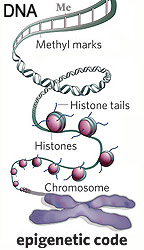
Image source (modified):
Jane Qiu, « Epigenetics: Unfinished symphony »,
Nature 441, p. 143-145
(May 11, 2006) [doi:10.1038/441143a]
The way nature works is often a mystery and our
understanding limited. It was only in 1953 that Francis Crick et al developed
the first model of DNA structure, the double helix.
The conventional view of inheritance is that DNA carries all the heritable
information and that nothing individuals do in their lifetime will be passed on
to their children.
Today biology stands on the brink of a shift in the understanding of
inheritance. The discovery of epigenetics hidden influences upon the genes
could affect every aspect of our lives.
At the heart of this new field is a simple but contentious idea that genes
have a 'memory'. That the lives of your grandparents the air they breathed,
the food they ate, even the things they saw can directly affect you, decades
later, despite your never experiencing these things yourself. And what you do in
your lifetime could in turn affect your grandchildren.
To many scientists, epigenetics amounts to heresy but it adds a whole new
layer to genes beyond DNA. It proposes a control system that turn genes on or
off and suggests that things people experience and the way they experience
them can cause heritable effects in humans.
This revolutionary work actually tells us that our ways of thinking, acting and
experiencing the world control our DNA and not vice versa. Revolutionary indeed,
as this new science brings the human being from the realm of slave to that of
a free actor in the world.